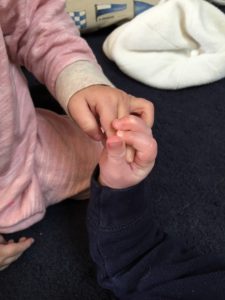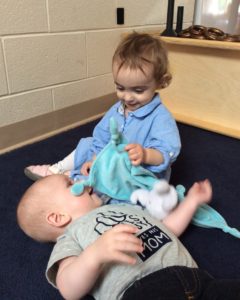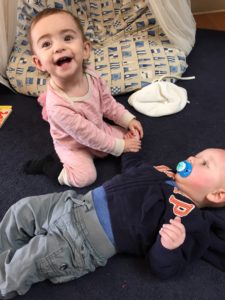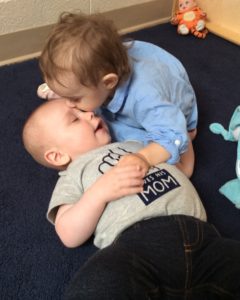“Engagement refers to a state of being genuinely involved and interested in what one is doing. Optimal conditions for learning occur when we are fully engaged.” – ‘How Does Learning Happen?’ Ontario’s Pedagogy for the Early Years, pg 35
 We believe in infants’ desire to, and their capabilities of, having deep engagement with one another. The following is but one example.
We believe in infants’ desire to, and their capabilities of, having deep engagement with one another. The following is but one example.
From the day that Aubree joined our classroom, we observed her interest in the other children. She was especially drawn to our youngest infant, Arie.
When playing on the floor, Aubree will sit as close to him as possible, gently touching his arms, tummy, and head, while saying “Hi” in a warm and loving tone. She often takes his hand gently in hers and, while rocking back and forth, offers her representation of “Row, Row, Row Your Boat.” Arie reciprocates Aubree’s affection; his eyes widen and brighten the moment he sees her and he always responds to her with giant smiles and coos of delight.
Aubree has also learned to read Arie’s cues and emotions. She loves to care for him and likes to bring him his soother and special blanket when he shows signs of discomfort. These are the beginnings of empathy, when we desire to listen, understand and respond to the needs of others. When Arie shows delight by raising his eyebrows, smiling and waving his arms and legs in the air, Aubree feels valued and important. Through these intimate moments Aubree and Arie have formed a wonderful friendship, where both children are sharing a deep interest and engagement.
“Psychologists and neuroscientists have discovered that babies not only learn more, but imagine more, care more, and experience more than we would ever have thought possible. In some ways, young children are actually smarter, more imaginative, more caring and even more conscious than adults are.” Gopnik, Alison. (2009). The Philosophical Baby – What Children’s Minds Tell Us about Truth, Love & the Meaning of Life. Farrar, Straus & Giroux.
 As educators, we see these wonderful and significant moments and celebrate them with our hearts and our minds. We foster them by creating uninterrupted time and inviting spaces for engagement to be nurtured each day. Our role is also to notice, record, model and offer words of encouragement as these interactions develop. This practice facilitates success in these early stages of engagement, relationships and social development.
As educators, we see these wonderful and significant moments and celebrate them with our hearts and our minds. We foster them by creating uninterrupted time and inviting spaces for engagement to be nurtured each day. Our role is also to notice, record, model and offer words of encouragement as these interactions develop. This practice facilitates success in these early stages of engagement, relationships and social development.
Footnote:
Many stories, including the one above, are displayed as documentation panels throughout our programs for children and families to view. Documenting and highlighting positive social–emotional behaviours, for others to see and for children to revisit, helps foster the kind of community we hope to create for ourselves, our Compass ELC families and our community.
Julie Aldrich-Cunday RECE, Compass ELC Victoria Graduate Program, Lindsay (August 2016)
To read previously posted Compass ELC Blogs, please click HERE





